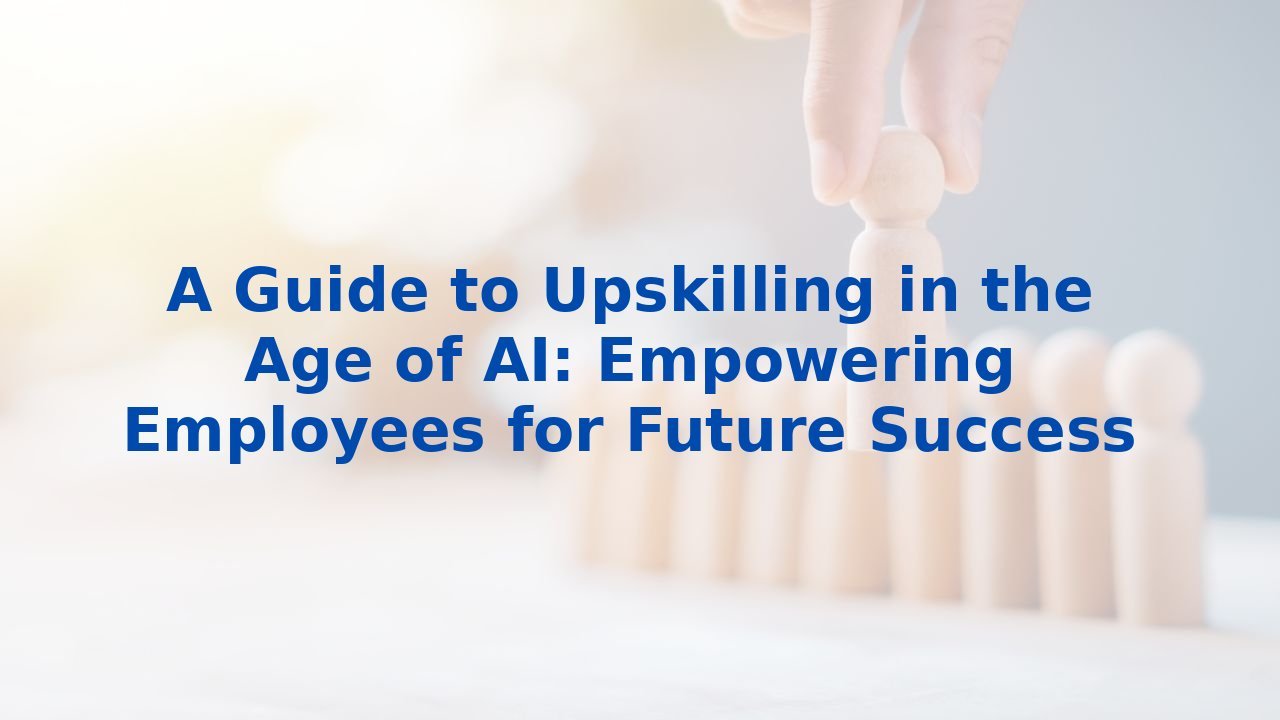A Guide to Upskilling in the Age of AI: Empowering Employees for Future Success
A Guide to Upskilling in the Age of AI: Empowering Employees for Future Success
In an era where technology evolves with breathtaking speed, the imperative for businesses to adapt and innovate has never been greater. The arrival of Artificial Intelligence (AI) has not only transformed the landscape of business processes but has redefined the very essence of work itself. To thrive in this shifting paradigm, organizations must prioritize upskilling their workforce—a move that not only enhances efficiency but also empowers employees to reach their fullest potential.
Understanding Business Process Management
To grasp the significance of AI in today’s business operations, it's crucial to understand the role of Business Process Management (BPM). BPM entails a systematic approach that boosts efficiency, productivity, and quality across various operations. As companies cultivate their BPM strategies, the integration of AI has emerged as a game-changer, unlocking potential previously thought unattainable. By leveraging AI, organizations can uncover inefficiencies and streamline processes to foster a culture of continuous improvement.
Enhancing Business Processes with AI
The transformative power of AI can be felt in multiple facets of business processes, including:
Process Discovery and Mapping
AI tools employing process mining and natural language processing can reveal a company's existing processes through real-time data analysis. This unearthing of information enables businesses to create accurate process maps and recognize inefficiencies that might go unnoticed. Because these discoveries happen in real-time, they not only keep documentation current but also signal opportunities for improvement.
Process Automation
Robotic Process Automation (RPA) harnessed by AI serves as the backbone for automating repetitive and rule-based tasks. By relentlessly performing these tasks with precision, AI empowers employees to shift their focus from mundane operations to more strategic initiatives, essentially reshaping the workplace into one of creativity and innovation.
Process Improvement
AI's role extends beyond just mapping and automating; it fuels ongoing process improvement. By providing data-driven insights and recommendations, AI enables businesses to pinpoint and address bottlenecks and redundancies, thereby informing strategic decisions and fostering a culture of sustainability.
Real-Time Monitoring and Predictive Analytics
Imagine having the capability not just to respond to issues as they develop but to foresee potential challenges before they arise. AI makes this vision a reality with its robust features for real-time monitoring and predictive analytics. By detecting anomalies and anticipating bottlenecks, organizations can adjust their strategies proactively, ensuring alignment with their overarching goals.
The Multifaceted Benefits of AI in Business
Integrating AI into BPM comes with a treasure trove of benefits:
- Improved Efficiency: By automating routine tasks, AI saves time and effort, allowing human resources to focus on higher-value work.
- Enhanced Decision-Making: AI's wealth of data enables explored scenarios and optimum choices, leading to informed decision-making.
- Increased Productivity: With repetitive tasks offloaded to algorithms, employees enjoy the freedom to engage in activities that enhance organizational growth.
- Reduced Errors: AI's inherent accuracy minimizes human error, instilling reliability in core operational activities.
Investing in Employee Training: A Necessity
The allure of AI is undeniable, but for organizations, maximizing its potential hinges on the capability of its workforce. As businesses intertwine AI into their processes, the necessity for employee training becomes paramount. This training can empower employees to:
- Collaborate Effectively: When employees grasp the intricacies of AI systems, a productive synergy emerges, facilitating a collective pursuit of organizational excellence.
- Enhance Problem-Solving: Armed with AI knowledge, employees can troubleshoot challenges inherent in AI integration, promoting smoother transitions.
- Adapt to Changes: With upskilling in AI, employees become versatile, ready to tackle evolving business needs and seize new opportunities.
Conclusion
As we navigate the intricate tapestry of the modern workplace, the integration of AI stands as a cornerstone of operational success. By embracing AI for process discovery, automation, and continual enhancement, organizations can not only streamline their operations but also future-proof their workforce. Investing in employee training is not just a good practice—it's a strategic imperative. By cultivating an environment where employees are empowered with AI skills, organizations can realize sustained excellence and unlock their true potential.
For further insights and resources on training your employees for success in the age of AI, consider exploring various courses or learning more about our mission in AI education.



